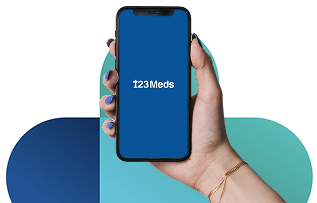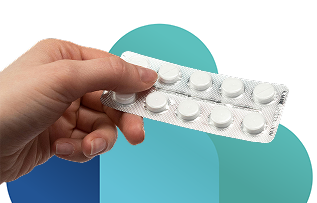Chlamydia
From £19.99
Chlamydia is a common sexually transmitted infection (STI) that often has no symptoms, but can cause discomfort, discharge, or pain if left untreated. Early treatment is important to prevent complications and reduce the risk of passing it on to others.
Through 123Meds, you can receive expert-approved treatment for chlamydia that are tailored to your needs and easy to take. Treatment through our service are discreet, confidential, and designed to fit around your lifestyle.

pharmacists

consultations & orders

delivery before 3:30PM

Available Now
Chlamydia is the most common sexually transmitted infection (STI) in the UK, caused by the bacterium Chlamydia trachomatis. Many people have no symptoms, meaning the infection can go unnoticed and untreated.
According to NHS data, over 200,000 people tested positive in 2012, with 64% of cases in those under 25.
The good news is that chlamydia is easily treated with antibiotics, which can be prescribed online if you've tested positive. Treatment is usually effective within one week, but if symptoms persist, further testing or an alternative antibiotic may be needed.
Unlike viral STIs such as herpes, chlamydia is curable. However, re-infection is possible, so it's important that your sexual partners are tested and treated as well. Using condoms remains one of the most effective ways to prevent transmission.
Chlamydia is caused by the bacterium Chlamydia trachomatis. It’s easily transmitted through unprotected sexual contact, but also easily preventable—using a condom significantly reduces the risk of infection.
The bacteria typically infect the urethra in men and the vagina in women, but it can also affect the throat or rectum in both sexes. Transmission occurs through the exchange of sexual fluids or direct genital contact during vaginal, anal, or oral sex. Pregnant women can also pass the infection to their baby during childbirth.
A key reason chlamydia spreads so easily is that it often causes no symptoms. Up to 50% of men and 70% of women may be infected without knowing it.
Because of this, practising safe sex and using condoms is crucial—even when no symptoms are present. If you're sexually active or have had unprotected sex, it's important to get tested regularly at a sexual health clinic or with a home test kit.
Chlamydia often has no noticeable symptoms, making it easy to go undetected. When symptoms do occur, they can appear from one week to several months after exposure.
In women (or anyone with a vagina), common chlamydia symptoms include unusual vaginal discharge, bleeding between periods or after sex, pain or burning when urinating, and lower abdominal discomfort.
In men (or anyone with a penis), symptoms may include a white, cloudy, or watery discharge from the tip of the penis, itching or burning around the genitals, swollen or painful testicles, and pain when urinating.
Chlamydia can also infect other areas exposed to the bacteria, leading to rectal pain, discharge, or bleeding, a sore throat, and red, irritated, or sticky eyes.
If left untreated, chlamydia can cause serious long-term health problems, so early testing and treatment are essential.
Chlamydia is easily treated with antibiotics, either as a single dose or a short course lasting 7 to 14 days. In some cases, treatment may begin before test results are confirmed to prevent complications and reduce the risk of spreading the infection.
A follow-up test may be recommended after treatment to ensure the infection is fully cleared—especially if symptoms persist or if you're pregnant. Pregnant individuals are usually re-tested 4 weeks after completing treatment to confirm the infection is gone.
Timely treatment is key to avoiding long-term health issues and stopping the spread of chlamydia.
Is chlamydia common in the UK?
Chlamydia is one of the most common sexually transmitted infections (STI) in the UK, with up to one in ten sexually active young people affected. Chlamydia is usually passed from person to person through unprotected sex.
Is chlamydia a sign of an underlying health problem?
Chlamydia itself is an infection; however, if it remains untreated, it can lead to more severe complications such as pelvic inflammatory disease (PID) in women or epididymitis in men. This may indicate broader reproductive health concerns that require medical attention.
What is the best medicine to treat chlamydia?
Antibiotics are the first line of treatment for chlamydia. The most common antibiotics offered are doxycycline and azithromycin. The current gold standard treatment is a 7-day course of the oral antibiotic Doxycycline.
Can lifestyle changes help with chlamydia?
While lifestyle changes cannot cure chlamydia, practising safe sex—such as using condoms, reducing the number of sexual partners, and undergoing regular STI screenings—can significantly reduce the risk of contracting or spreading the infection.
How to take Doxycycline treatment for Chlamydia?
The usual course of treatment is one tablet taken twice a day for seven days. Each tablet should be swallowed whole with plenty of water. Doxycycline is best taken with food or a glass of milk, and should be taken at least one hour before going to bed to avoid irritation of the throat.
It’s important to complete the full seven-day course, even if your symptoms improve earlier, to make sure the infection is fully cleared. You should avoid having sex until you have finished all seven days of treatment to prevent passing the infection on.
Can you cure Chlamydia?
Yes, chlamydia can be effectively treated and cured with antibiotics. While some bacteria are becoming more resistant to certain antibiotics, chlamydia is still treatable with a range of effective options.
Can you get chlamydia from oral sex?
Yes, chlamydia can be passed on through oral sex if you come into contact with infected bodily fluids, as the bacteria Chlamydia trachomatis can cause infection in the throat or genitals.
How long can you have chlamydia without knowing or before it causes harm?
The time it takes for chlamydia to cause damage depends on how quickly it spreads. In women, the infection can reach the fallopian tubes and lead to pelvic inflammatory disease (PID), which may cause permanent scarring and increase the risk of infertility. In men, chlamydia can spread to the testicles and cause inflammation of the epididymis (epididymitis), leading to pain and possible fertility issues. Prompt diagnosis and treatment are important to prevent long-term damage to the reproductive system.
Does chlamydia go away on its own?
No – it’s very unlikely that your immune system can fully clear a chlamydia infection without treatment. Symptoms may temporarily improve, but the infection will remain and can still be passed to others. It’s important to get tested and treated as soon as possible to prevent long-term damage to your reproductive system.
Can you get chlamydia from kissing?
No, chlamydia isn’t spread through kissing. It’s passed on through contact with infected bodily fluids, typically during vaginal, anal, or oral sex. You can’t catch chlamydia from kissing, hugging, sharing towels, toilet seats, or through coughing or sneezing.
Fill out a quick form!
Fast, safe online consultations – no need to visit a GP or pharmacy.

Select your medication
Once you’ve completed the assessment, we’ll show you treatments that are right for you.

Prescriber review
Our prescribers will review your consultation and, if it's right for you, send a prescription to our pharmacy.

Express Delivery
Discreet delivery straight to your door, as soon as the next day.

Our 5-Point Safety Guarantee
We focus on trust, privacy, and expert service in online medication ordering.
GPHC and MHRA Regulated Pharmacy
Regulated by all necessary UK regulatory bodies
UK qualified Pharmacists
All consultations reviewed by UK pharmacists
Authentic Medication
Sourced from approved suppliers only
Customer Care
Customer care team available via email or phone
Trusted by Thousands
Thousands of satisfied customers

pharmacists

consultations & orders

delivery before 3:30PM

Available Now

